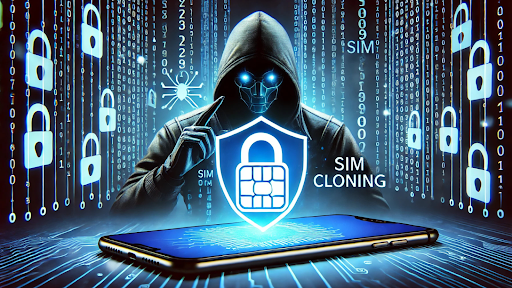Don’t want to alarm you, but this is something important to be aware of. 60% of fraud originates from mobile devices. Once they obtain your phone number, if you are not aware and alert, you are at high risk of falling victim to scams or fraud. Scammers can use various methods to access personal information and control your social media and even bank accounts.
What is SIM Cloning?
SIM cloning is a method in which a fraudster tricks your carrier into transferring your phone number to a new SIM card. As a result, they have an exact copy of your SIM. This allows them to intercept your calls and messages, one-time passwords, account verification codes, passwords reset, and gain unauthorized access to your bank details and accounts.
What Kind of Information is Stored on a SIM Card?
A SIM card has a very limited storage capacity but it stores key information for user authentication and device identification on mobile networks.
| Data | Description |
| International Mobile Subscriber Identity (IMSI) | A unique identifier that links the SIM card to the mobile network. |
| Integrated Circuit Card Identifier (ICCID) | A unique serial number assigned to the SIM card. |
| Authentication Key (Ki) | A secret key used for network authentication and security. |
| Local Area Identity (LAI) | Information about the last registered location area in the network. |
| Mobile Network Settings | Includes preferred network lists, roaming settings, and access points. |
| Short Message Service (SMS) Storage | Stores a limited number of text messages (usually up to 100-250). |
| Contacts | Stores a limited number of contacts with names and phone numbers. |
| Service Provider Name (SPN) | The name of the mobile network provider. |
| Emergency Call Codes | Stores emergency numbers that can be dialed without a network. |
| Temporary Mobile Subscriber Identity (TMSI) | A temporary identifier assigned by the network to enhance privacy. |
| Application Toolkit (SIM Toolkit Data) | Stores applications and services provided by the carrier, like mobile banking. |
| Call Logs (Limited Data) | Some SIM cards can store basic call records. |
Note: If you are using an eSIM for international travel, it does not store SMS, contacts or call logs. When you buy an eSIM online, the data is not preloaded. It is remotely provisioned by the carrier.
How will I know if my SIM has been Cloned?
The following signs may indicate that your SIM has been compromised:
- You no longer receive calls or text messages.
- You receive an unexpected message asking you to restart your device.
- Location trackers show that your device is active in an unfamiliar location.
- You are unable to access your online accounts.
- Sudden loss of network connectivity
- International calls or unusual charges
- Your contacts receiving suspicious messages
- Unknown device registered with apps like banking apps
- Your calls being diverted
If you notice any of these signs, immediately contact your mobile service provider.
Impacts of SIM Cloning
Hackers can use SIM cloning for the following malicious purposes:
- Financial Fraud
- Identity theft
- Blackmailing
- Eavesdropping
- Terrorism
Cybercriminals usually target high net-worth individuals, high-profile personalities, business owners, and military personnel (to gain access to classified information). However, anyone can be a victim of SIM cloning. So, whether you are using a physical SIM or purchasing eSIM online, stay alert.
Can eSIM be cloned?
An eSIM for international travel or local use is not a physical card; it is embedded in the circuit board of your phone. You can store multiple carrier profiles in your eSIM. An eSIM for international travel is especially beneficial for travelers, as it allows them to remotely switch profiles and access data and other services, all without the need to visit an outlet.
An eSIM is inherently safer than a physical SIM card as it is, not physical. It is not preloaded with data. You need to download a carrier profile (including information like IMSI, ICCID, and authentication details) and activate it.
There is no risk of removing or swapping SIM cards. Thanks to their unique security architecture and enhanced encryption protocols, eSIMs from trusted providers like Numero eSIM are difficult to clone. An eSIM has an additional layer of protection due to the overall security framework of your device (such as fingerprint scanners, facial recognition and other biometric security features).
So, purchase eSIM online, especially if you are a frequent international traveler.



